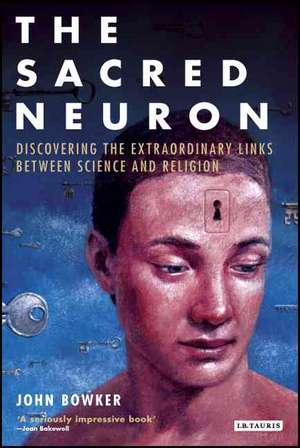The Sacred Neuron: Extraordinary New Discoveries Linking Science and Religion
Autor John W. Bowkeren Limba Engleză Paperback – 30 apr 2007
Preț: 128.47 lei
Nou
Puncte Express: 193
Preț estimativ în valută:
24.59€ • 25.29$ • 20.40£
24.59€ • 25.29$ • 20.40£
Carte disponibilă
Livrare economică 25 ianuarie-08 februarie
Preluare comenzi: 021 569.72.76
Specificații
ISBN-13: 9781845113995
ISBN-10: 1845113993
Pagini: 226
Dimensiuni: 158 x 232 x 19 mm
Greutate: 0.38 kg
Ediția:Reprint
Editura: I. B. Tauris & Company
Locul publicării:United Kingdom
ISBN-10: 1845113993
Pagini: 226
Dimensiuni: 158 x 232 x 19 mm
Greutate: 0.38 kg
Ediția:Reprint
Editura: I. B. Tauris & Company
Locul publicării:United Kingdom
Notă biografică
John W. Bowker was formerly Professor of Religious Studies at Lancaster University and a Fellow of Trinity College Cambridge. Now retired, he is one of the best-known contemporary writers on religion and is the author of many books, including The Meanings of Death, and God: A Brief History
Recenzii
'Whether goodness will survive modernity is one of the most urgent questions of our age. In this lucid and erudite work, John Bowker discovers the surprising outlines of an answer.' - Bryan Appleyard, author and journalist 'Never was a book more timely for the world. Just when it seems that moral absolutes have either been swept away or have staged a frightening and unyielding comeback, John Bowker steps forward to explain how we can find some sure footing in the world of aesthetic and moral ambiguities. Citing the latest scientific research and drawing on cultural references that range from Stravinsky to Bertrand Russell, and from George Orwell to John Betjeman, he offers us new insights into how we can claim something is beautiful or something is good. Then with meticulous scholarship, he traces the origin of religions in the human community and explains how and why the need for them persists. The Sacred Neuron is a seriously impressive book.' - Joan Bakewell, writer and broadcaster 'Scholarship of this quality is so rare, particularly in the domain of "science and religion". Bowker's discussion of 'truth' and its relevance to an understanding of the world's religions and the animosities between them is replete with a poignant wisdom, born of his great understanding of so many religious traditions. The Sacred Neuron is an eloquent testimony to the value of informed interdisciplinary reflection.' - John Hedley Brooke, Andreas Idreos Professor of Science and Religion, University of Oxford 'The Sacred Neuron is a rare mixture of intellectual, religious, aesthetic and ethical history and theology, all enhanced by John Bowker's special compound of meticulous scholarship and deep faith. The book is brave and broad. Reading it mingles fascination with pleasure.' - Peter Hennessy, Attlee Professor of Contemporary History, Queen Mary, University of London 'The Sacred Neuron is one of the first books to take seriously the impact of modern neuroscience on how our perception of the external world must affect our understanding of emotion, rationality, ethics and religion. With great charm and humour, and with extraordinary breadth of scholarship, Bowker shows how religious experience might be said to have meaning in the twenty-first century. His book will become a classic.' - Mark Williams, Professor of Clinical Psychology, University of Oxford
